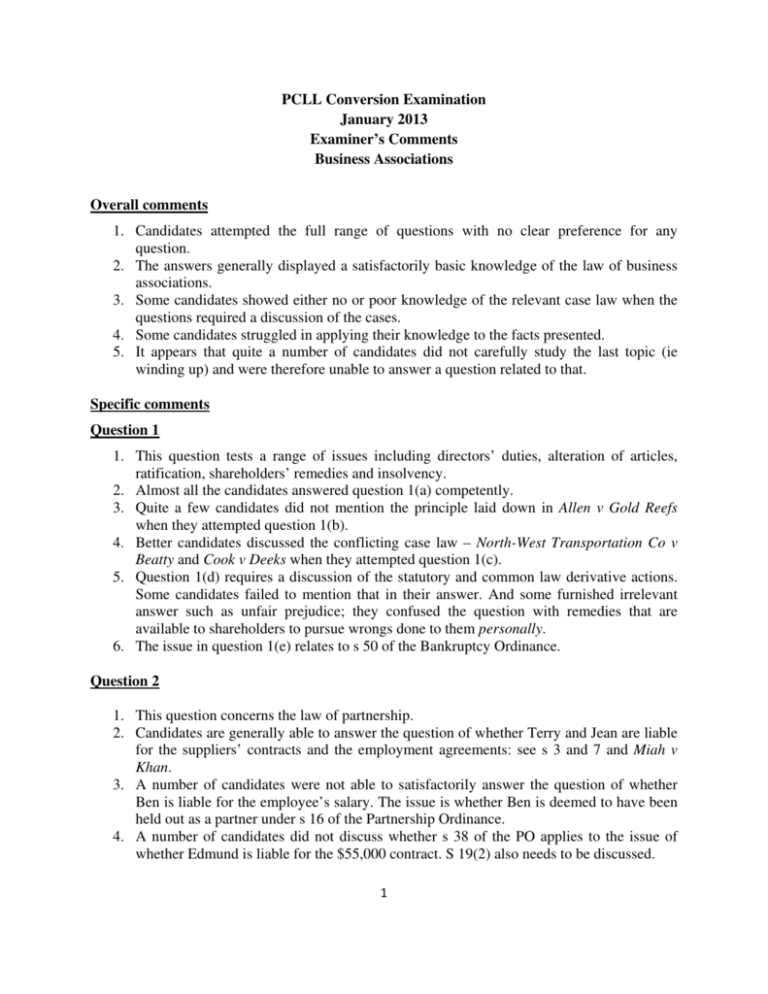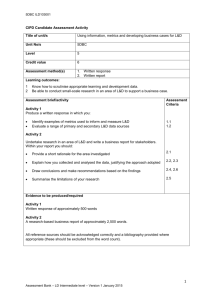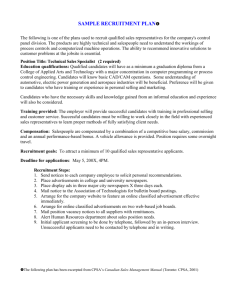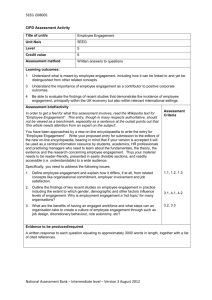PCLL Conversion Examination January 2013 Examiner's Comments
advertisement

PCLL Conversion Examination January 2013 Examiner’s Comments Business Associations Overall comments 1. Candidates attempted the full range of questions with no clear preference for any question. 2. The answers generally displayed a satisfactorily basic knowledge of the law of business associations. 3. Some candidates showed either no or poor knowledge of the relevant case law when the questions required a discussion of the cases. 4. Some candidates struggled in applying their knowledge to the facts presented. 5. It appears that quite a number of candidates did not carefully study the last topic (ie winding up) and were therefore unable to answer a question related to that. Specific comments Question 1 1. This question tests a range of issues including directors’ duties, alteration of articles, ratification, shareholders’ remedies and insolvency. 2. Almost all the candidates answered question 1(a) competently. 3. Quite a few candidates did not mention the principle laid down in Allen v Gold Reefs when they attempted question 1(b). 4. Better candidates discussed the conflicting case law – North-West Transportation Co v Beatty and Cook v Deeks when they attempted question 1(c). 5. Question 1(d) requires a discussion of the statutory and common law derivative actions. Some candidates failed to mention that in their answer. And some furnished irrelevant answer such as unfair prejudice; they confused the question with remedies that are available to shareholders to pursue wrongs done to them personally. 6. The issue in question 1(e) relates to s 50 of the Bankruptcy Ordinance. Question 2 1. This question concerns the law of partnership. 2. Candidates are generally able to answer the question of whether Terry and Jean are liable for the suppliers’ contracts and the employment agreements: see s 3 and 7 and Miah v Khan. 3. A number of candidates were not able to satisfactorily answer the question of whether Ben is liable for the employee’s salary. The issue is whether Ben is deemed to have been held out as a partner under s 16 of the Partnership Ordinance. 4. A number of candidates did not discuss whether s 38 of the PO applies to the issue of whether Edmund is liable for the $55,000 contract. S 19(2) also needs to be discussed. Question 3 1. This question raises issues relating to authority of directors to bind the company, amendment of articles, lifting of the corporate veil and corporate attribution. 2. Question 1(a) requires a discussion of the indoor management rule, implied and apparent authority. 3. Candidates should discuss the principle laid down in Lee v Chou Wen Hsien in question 1(b). 4. The key issue in question 1(c) is whether the amendment was made bona fide for the benefit of the company as whole (see Allen v Gold Reefs; Shuttleworth). 5. There are two parts to question 1(d): corporate attribution (Tesco Supermarkets v Nattrass and Meridian Global Funds Management Asia Ltd v Securities Commission) and lifting of the corporate veil. Many candidates only discussed the second part. Question 4 1. The fundamental error committed by many candidates is that they failed to understand the different remedies which are available to shareholders who wish to pursue wrongs done to them personally versus wrongs done to the company. 2. All three remedies must be discussed and evaluated: unfair prejudice (s 168A), contractual remedy (s 23) and winding up (s 177(1)(f)). Many candidates merely described one or more of the remedies without analyzing which one of them is the most effective. 3. Many candidates provided irrelevant answer such as common law and statutory derivative actions; these actions are intended to remedy the wrongs done to the company and not to shareholders personally.








